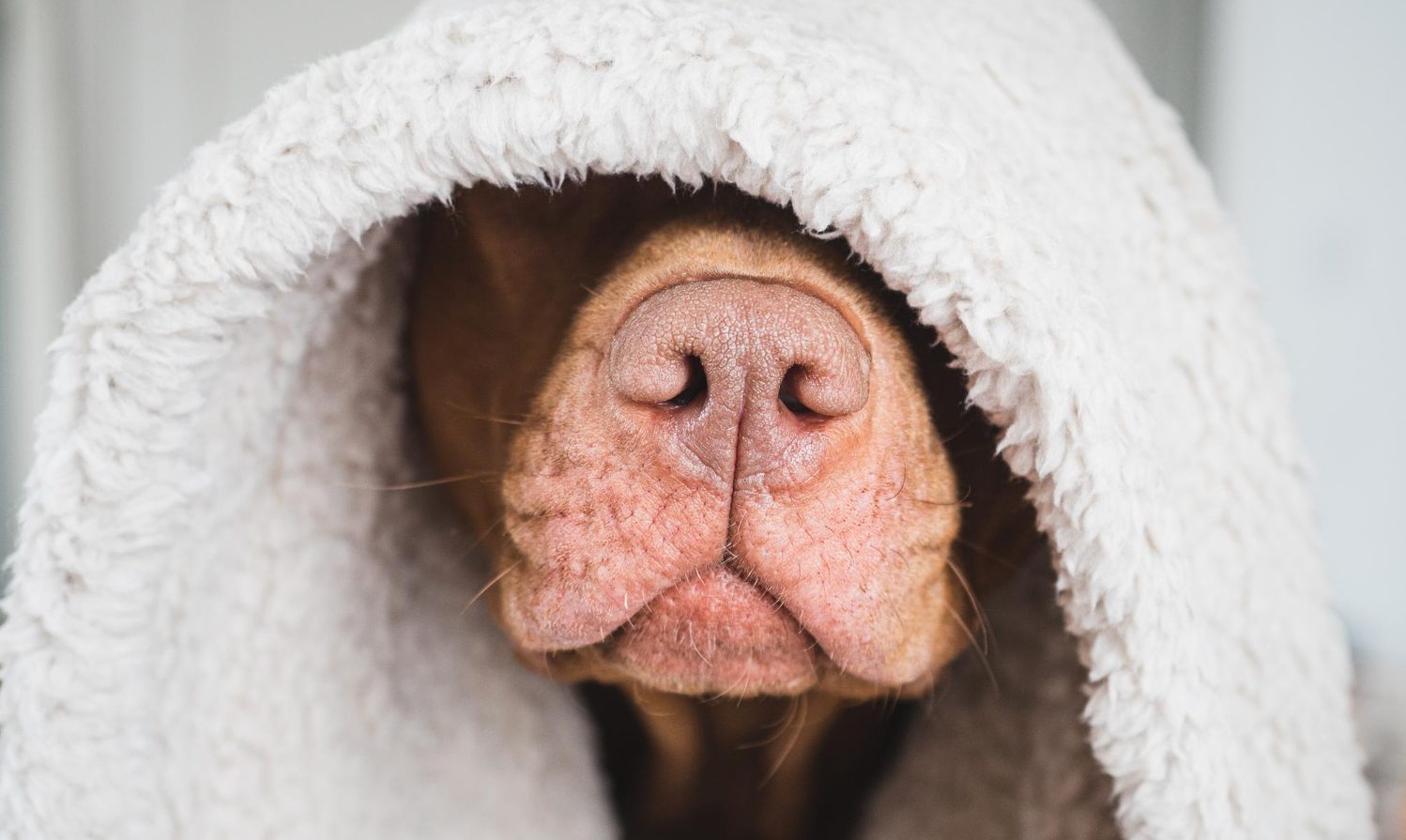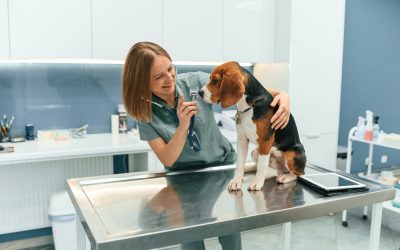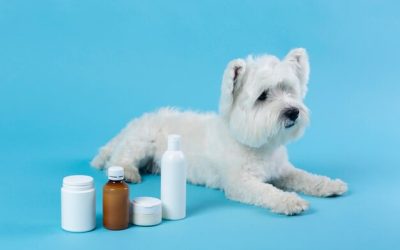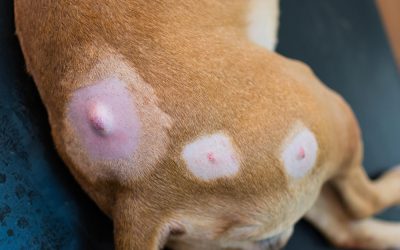Dog Acne on Back, Chin, and Lip

Updated November 15, 2025
Did you know that dogs can occasionally develop pimple-like bumps and redness on their back, chin, or lip? This comprehensive article will walk you through the causes, symptoms, diagnosis, and treatment options for dog acne. We’ll also provide practical tips for preventing this condition, highlight the importance of seeking veterinary care for your furry friend’s well-being, and explain the benefits of pet insurance in managing the costs associated with treating dog acne so you can focus on your pet’s comfort rather than financial stress.
What Is Dog Acne and Why Does It Happen?
Dog acne, also known as canine acne or chin acne, is a common skin condition that can affect dogs of all breeds and ages, though some breeds may be more prone to it than others. Acne in dogs typically manifests as red bumps, pustules, or blackheads on your dog’s chin, your dog’s face, lip, and back. The lesions of dog acne often resemble human pimples, with similar red bumps, blackheads, and pustules that can cause discomfort for your beloved companion.
Just like in humans, dog acne occurs when the hair follicles become clogged with oil, dirt, or dead skin cells, causing dogs to develop pimples that may be irritating or painful.
Types of Dog Acne
Canine acne can manifest in several forms, each with its own unique characteristics and treatment considerations. The most common types include papules, pustules, nodules, and comedones, terms that sound medical but simply describe different kinds of bumps.
Papules are small, raised red bumps that develop when hair follicles become clogged with dead skin cells and excess oil. These bumps can be tender and may cause discomfort when touched. Pustules are similar in appearance but contain pus, indicating a possible bacterial infection within the hair follicle that may require antibiotic treatment.
Nodules are larger, firmer lumps beneath the skin’s surface that can be painful and, in some cases, may require surgical removal if they do not resolve with standard treatment. Comedones, often referred to as blackheads or whiteheads, form when hair follicles are blocked by oil and debris, creating visible plugs on the skin that resemble what humans experience.
Causes of Dog Acne
Several factors can contribute to the development of dog acne, and understanding these causes helps you prevent future outbreaks. One common cause is the excessive production of sebum, an oily substance produced by the sebaceous glands that normally lubricates the skin and hair. This overproduction of sebum can lead to clogged pores, which can form pimples and result in the formation of acne on your beloved pet.
Additionally, hormonal imbalances common during adolescence or certain health conditions, poor grooming habits that allow dirt buildup, food allergies that trigger skin reactions, allergies to environmental factors, stress that affects your dog’s immune system, or a weakened immune system can also play a significant role in the development of dog acne. Certain dog breeds may be more prone to developing acne due to their skin type, facial structure, or physical features, such as skin folds that trap moisture and bacteria.
Diagnosis of Dog Acne
If you suspect that your dog has acne, we strongly advise seeking veterinary care for a proper diagnosis rather than attempting to treat it yourself without guidance. Your veterinarian will thoroughly examine your dog’s skin and may perform additional tests to rule out other underlying conditions, such as skin lumps or more serious issues.
These tests may include skin scrapings to check for parasites or fungal infections, bacterial cultures to identify any infection present, or allergy testing to determine if environmental or food allergies are contributing factors. A microscopic examination of samples may also be performed to confirm the diagnosis and ensure accurate treatment.
A thorough diagnosis is crucial to ensure your dog receives the appropriate treatment that addresses the root cause, and your veterinarian will develop a personalized treatment plan based on the findings to give your beloved companion relief and comfort.
Treating Dog Acne on the Back
When treating dog acne on the back, it’s important to keep the affected area clean and free of excess oil and dirt to maintain the health of your dog’s skin and prevent further irritation. You can gently wash your dog’s back with a mild antibacterial soap or a specialized dog acne shampoo recommended by your veterinarian. Oatmeal baths can also be a soothing option for irritated skin, providing relief and comfort to your furry friend.
Avoid using harsh or human-specific products, as they can further irritate your dog’s sensitive skin and exacerbate the condition. Additionally, your veterinarian may prescribe topical or oral medications to help reduce inflammation and control bacterial growth. Products containing benzoyl peroxide are commonly recommended for effectively treating dog acne.
Acne medications, serums, and soaps made for humans may not be dog-safe or may cause serious issues with their sensitive skin, so it’s critically important only to use dog-specific products when treating your dog’s acne.
Treating Dog Acne on the Chin
Your dog’s chin acne can be particularly bothersome for your dog, as this area is constantly moving and exposed to food, water, and other irritants. To alleviate their discomfort, gently clean the affected area using a cleanser or wipes specifically formulated for dogs, taking care not to irritate the surrounding skin and avoid worsening the condition.
You can also apply a warm compress to the chin to help reduce swelling and promote healing, providing soothing relief that your dog will appreciate. In some cases, your veterinarian may recommend topical ointments or antibiotics to treat more severe cases of chin acne that don’t respond to basic cleaning alone.
Treating Dog Acne on the Lip
Dog acne on the lip can be challenging to treat due to the constant movement and exposure to saliva that washes away topical treatments. An allergic reaction to food bowls, cleaning products, or other environmental factors could also cause swelling or irritation in this area. Consider consulting your veterinarian if symptoms persist despite treatment.
To prevent further irritation, it is essential to prevent your dog from licking or biting the affected area, which can introduce more bacteria and delay healing. You can use a cone collar or a bitter-tasting spray to deter them from doing so. Similar to treating other areas, keeping the lip clean with gentle cleansing products and applying prescribed topical medications can aid in healing and reducing inflammation for your beloved pet’s comfort.
Preventing Dog Pimples
While dog acne can be difficult to prevent entirely, there are practical measures you can take to minimize the risk for your dog and keep their skin healthy. Regular grooming, including brushing your dog’s coat and cleaning all areas of your dog’s body, can help remove excess oil and dirt that may cause your dog to develop pimples.
Using dog-specific grooming products and avoiding human-specific products is also crucial, as some ingredients in human products can be harmful to dogs’ sensitive skin and cause reactions you want to avoid. Additionally, maintaining a healthy diet that supports skin health, managing stress levels through exercise and mental stimulation, and ensuring your canine companion has a clean environment can all contribute to preventing dog acne and keeping your pet comfortable.
Understanding Contagiousness and Potential Complications
Dog acne is not contagious, so you don’t have to worry about it spreading to other pets or humans in your household. This skin condition is typically the result of underlying skin conditions, hormonal changes, or clogged hair follicles rather than an infectious agent that can be transmitted.
However, if left untreated, dog acne can lead to complications that may impact your dog’s comfort and well-being. Secondary bacterial infections are a common concern, as open or irritated bumps can allow bacteria to enter the skin, causing further inflammation and discomfort that makes your beloved pet miserable.
In severe cases, chronic irritation and infection can contribute to the development of more serious issues such as mast cell tumors or sebaceous cysts, both of which may require surgical removal. Additionally, persistent skin irritation can trigger allergic reactions, making the affected areas even more sensitive and creating a cycle of discomfort.
When to See a Veterinarian
If you notice persistent or worsening symptoms of dog acne, it is essential to consult with a veterinarian rather than trying to handle it alone. Some skin growths, such as benign tumors, malignant tumors, or fatty tumors, may resemble acne and require professional evaluation to ensure proper diagnosis and treatment—you don’t want to misdiagnose a serious condition.
Your veterinarian can properly diagnose the issue and recommend the most suitable treatment options for your dog’s specific condition based on their expertise. It’s also important to seek veterinary care if other concerning symptoms, such as fever, lethargy, or loss of appetite, accompany your dog’s acne, as these could indicate a more serious underlying problem requiring immediate attention.
How Can Pet Insurance Help You if Your Dog Needs Treatment?
Pet insurance can be a valuable tool in managing the costs of treating a dog’s veterinary expenses. By having a pet insurance policy in place, you can have peace of mind knowing that you can provide medical care for your furry companion without worrying about the financial burden. Pet insurance can help cover the costs of veterinary consultations, diagnostic tests, medications, and even specialized treatments if required.
Reimbursement
This method is the most common for pet insurance companies. You pay out of pocket for the veterinarian bill, and then the insurance company reimburses you for what’s covered under the insurance plan. The steps look like this.
- You pay the vet bill after your dog’s visit.
- You fill out the pet insurance claim form.
- Submit the claim form and other required documentation to the insurer.
- After the claim is approved, you will be reimbursed for eligible expenses.
What Does Odie Pet Insurance Cover?
Pet insurance covers various veterinary expenses, providing financial protection and peace of mind for pet owners. Here are the details of the coverage options offered by Odie Pet Insurance:
Illness & Injury Plan
The Illness & Injury Plan is an all-inclusive insurance plan designed to cover a wide range of medical needs for your pet. This plan includes comprehensive coverage for various illnesses, injuries, and veterinary services. Some of the covered items include:
- Veterinary exams and consultations
- Diagnostics (e.g., X-rays, lab tests)
- Prescribed medications
- Surgeries and hospitalization
- Rehabilitation, acupuncture, or chiropractic treatments
- Medically necessary supplies
The Wellness Plan
The Wellness Plan is a monthly membership that focuses on preventive care and covers routine veterinary services.
- Provides reimbursements for routine care items such as wellness visits (exams and vaccines), testing and parasite prevention, dental cleanings and at-home dental care, vitamins, supplements, and more.
- Through Odie’s partnership with Petivity, a leader in smart pet products and proactive care, Wellness Plan members can also receive reimbursements for Petivity devices and health kits, as well as eligible Purina food and supplements.
- Total reimbursement up to $700 per year.



